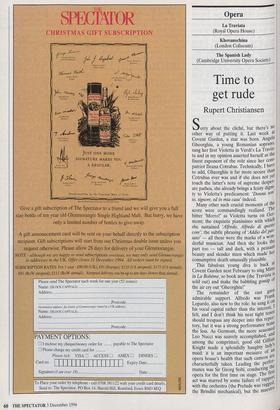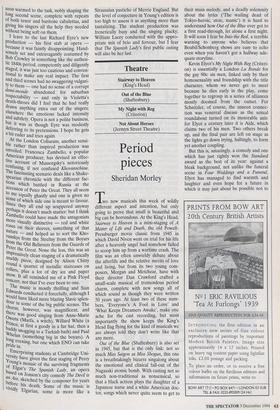Opera
La Traviata (Royal Opera House) Khovansehina (London Coliseum) The Spanish Lady (Cambridge University Opera Society)
Time to get rude
Rupert Christiansen
Sorry about the cliche, but there's 1'10 other way of putting it. Last week at Covent en Gard, a star was born. Angela Gheorghiu, a young Romanian soprano, sang her first Violetta in Verdi's La Travia- ta and in my opinion asserted herself as the finest exponent of the role since her com- patriot Deana Cotrubas. Technically, I have to add, Gheorghiu is far more secure than Cotrubas ever was and if she does not yet touch the latter's note of supreme despet.- ate pathos, she already brings a feisty dip', ty to Violetta's predicament: 'Donna son io, signore, ed in mia casa' indeed. Many other such crucial moments of the score were commandingly realized. The bitter 'Morro!' as Violetta turns on Ger" mont; the exquisite pianissimo with which she sustained 'Alfredo, Alfredo di questo core; the subtle phrasing of `Addio del P' sato' — all these were the marks of a woll` derful musician. And then she looks the part too — tall and dark, with a peasant beauty and slender mien which made her consumptive death unusually plausible. This fabulous young diva is back, at, Covent Garden next February to sing Mi111.1 in La Bohe me, so book now (the Traviata is sold out) and make the babbling gossip of the air cry out 'Gheorghiu!' The remainder of the cast gave admirable support. Alfredo was Fra" Lopardo, also new to the role: he sang it oa his vocal capital rather than the interest, I felt, and I don't think his neat tight tenor should trespass any deeper into this reper- tory, but it was a strong performancenone, the less. As Germont, the more seasonal., Leo Nucei was suavely accomplished,. u among the comprimari, good old Gilli m an Knight made a splendidly haughty lac131,5 maid: it is an important measure of opera house's health that such cameos are characterfully taken. Leading the perf°,r mance was Sir Georg Solti, conducting f,i'et opera for the first time on stage. The fill act was marred by some failure of rapin`' with the orchestra (the Prelude was raggeuo' the Brindisi mechanical), but the rnaesIr soon warmed to the task, nobly shaping the long second scene, complete with repeats of both tenor and baritone cabalettas, and giving his singers all the help they needed Without being soft on them. I leave to the last Richard Eyre's new production — his first stab at opera — because it was faintly disappointing. Hand- somely set and extravagantly costumed by Bob Crowley in something like the authen- tic 1840s period, competently and diligently staged, it was just too cautious and conven- tional to make any real impact. The first and third scenes had no swaggering vulgari- ty to them — one had no sense of a corrupt demi-monde abandoned for suburban respectability — and only in Violetta's death-throes did I feel that he had really drawn anything extra out of the singers; elsewhere the emotions lacked intensity and subtlety. Opera is not a polite business, but it was as though Eyre was modestly deferring to its pretensions. I hope he gets a bit ruder and tries again. At the London Coliseum, another sensi- ble rather than inspired production was unveiled. Francesca Zambello, a popular American producer, has devised an effec- tive account of Mussorgsky's notoriously confusing, if not confused Khovanschina. The fascinating scenario deals like a Shake- spearian chronicle with the different fac- tions which battled in Russia at the accession of Peter the Great. They all seem to me equally ghastly and one is given no sense of which side one is meant to favour. Sluice they all end up scuppered anyway Perhaps it doesn't much matter: but I think Zambello could have made the antagonists more visually distinctive — red and white roses on their sleeves, something of that nature — and helped us to sort the Kho- vanskys from the Streltsy from the Boyars from the Old Believers from the Guards of P. eter the Great. None the less, this was an Impressively clean staging of a dramatically muddy piece, designed by Alison Chitty round a quartet of metallic staircases on rollers, plus a lot of dry ice and paper snow. It all reminded me of a Pink Floyd concert, not that I've ever been to one. The music is mostly thrilling and Sian Edwards conducted it forcefully, although I would have liked more blazing Slavic splen- dour in some of the big public scenes. The chorus, however, was magnificent, and there was good singing from Anne-Marie Ovyens (Marfa, a witch), Willard White (a Prince, at first a goody in a fur hat, then a baddy snog-in- g. g in a Turkish bath) and Paul helan (something big in the boyars). A 1.01:1g evening, but one which ENO can take Pride in.
Enterprising students at Cambridge Uni- versity have given the first staging of Percy Young's mosaic of the surviving fragments !)f Elgar's The Spanish Lady, an opera based on Jonson's city comedy The Devil is .an Ass, sketched by the composer for years before his death. Some of the music is Vividly Elgarian, some is more like a Straussian pastiche of Merrie England. But the level of conjecture in Young's edition is too high to assess it as anything more than tantalizing. The student production was frenetically busy and the singing plucky; William Lacey conducted with the appro- priate mix of brio and fervour, but I fear that The Spanish Lady's first public outing will also be her last.











































































 Previous page
Previous page